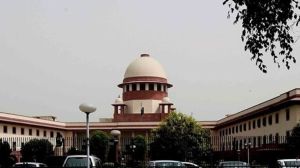Stay updated with the latest - Click here to follow us on Instagram
Delhi HC frames MTP guidelines in rape cases where pregnancy exceeds 24 weeks
The court also directed the Delhi government and the Centre to comply with the guidelines in two months.
 The court further directed the Department of Health, Delhi government and the Union Ministry of Health to comply with the guidelines and share its compliance with the court within two months. (Representational image)
The court further directed the Department of Health, Delhi government and the Union Ministry of Health to comply with the guidelines and share its compliance with the court within two months. (Representational image) While allowing a 25-weeks-pregnant minor rape victim to medically terminate her pregnancy, the Delhi High Court has issued guidelines for investigating officers in rape and other sexual assault cases where the length of pregnancy exceeds 24 weeks.
In its decision on Wednesday, a single-judge bench of Justice Swarana Kanta Sharma directed that a mandatory urine pregnancy test will be conducted during the medical examination of a sexual assault victim. If the victim is found pregnant and she gives consent for the medical termination of the pregnancy, the investigating officer will ensure that she is produced on the same day before a medical board as envisaged under Section 3 of the Medical Termination of Pregnancy Act.
The medical board, the court was informed, is present only in four Delhi hospitals–the All India Institute of Medical Sciences (AIIMS), Dr Ram Manohar Lohia Hospital, Safdarjung Hospital and Lok Nayak Jai Prakash Narayan Hospital.
The victim will be produced before the board, the court said. Once she is examined, an appropriate report will be submitted to authorities concerned “so that if an order is being sought regarding the termination of pregnancy from the courts, the court concerned does not lose any more time and is in a position to pass an order on the same expeditiously”. The high court observed that the provisions of the MTP Act mandates that the state government or the Union Territory administration has to ensure that medical boards are constituted in hospitals.
“The court is informed that such boards are not available in hospitals in each district, causing inconvenience to the investigating officers as well as to the victim at times who has to be taken for MTP and for further examination. Thus, the state government/Union Territory should ensure that such mandate of Section 3(2C) and 3(2D) of the MTP Act are complied with and such boards are constituted in all government hospitals which have proper MTP centres and it should be mandatory to have such boards constituted beforehand,” the court directed.
The court further directed the Department of Health, Delhi government and the Union Ministry of Health to comply with the guidelines and share its compliance with the court within two months.
The court was hearing a plea of a woman whose 14-year-old daughter was raped in September last year. On January 19, a medical examination found that she was 24 weeks 5 days pregnant. The investigating officer approached the Child Welfare Committee on January 20 and the girl and her mother were produced before the board seeking the medical termination of pregnancy. But it was noted that she was beyond the permissible gestational age limit under the MTP Act 1971, pursuant to which she approached the high court seeking the formation of a medical board to give its opinion as well as the medical termination of the girl’s pregnancy.
When the matter was heard on Tuesday, the court asked the woman and her daughter if they wanted to terminate the pregnancy and they replied in the affirmative. The court directed the investigating officer to take the minor victim for a medical examination before the medical board of the Ram Manohar Lohia Hospital on January 25. The board said in its report the minor is physically and mentally fit to undergo the medical termination of pregnancy and that the medical procedure and related complications were explained to her.
On Wednesday, the court directed that the medical termination of pregnancy of the minor victim will take place at 11am Friday at the Ram Manohar Lohia Hospital. The court directed the medical board and the hospital superintendent to ensure that the termination of pregnancy of the victim is carried out by competent doctors in accordance with the provisions of the MTP Act and other laws and guidelines. The court also directed that the tissue of the foetus will be preserved for DNA identification and other purposes, in reference to the criminal case against the rape accused and directed the state to bear all expenses. If the child is born alive, despite the the medical termination of pregnancy, doctors will ensure that everything reasonably feasible will be offered to “such child so that he or she develops into a healthy child”.
The court held that in cases of sexual assault, “denying a women right to say no to medical termination of pregnancy and fasten her with the responsibility of motherhood would amount to denying her human right to live with dignity as she has a right in relation to her body, which includes saying yes or no to being a mother” and that the MTP Act reiterated this right of a woman.
“To force the victim to give birth to the child of a man who sexually assaulted would result in unexplainable miseries. One will shudder to think what a victim who is carrying such foetus in her womb must be going through each day, being reminded constantly of the sexual assault that she has undergone. Cases where sexual assault results into the pregnancy of the victim are even more traumatic as the shadow of such tragic moment lingers on each day with the victim. It is this mental agony which has been taken into account by the MTP Act, which lays emphasis on not only grave physical injury but also the mental health of a pregnant woman,” the court observed.
The court said the minor girl was a victim of rape and seeking the medical termination of pregnancy was recognised as a human right because denying it would affect her dignified existence, which is also protected under the Constitution’s Article 21.
Justice Sharma said it would not be appropriate to expect the minor rape victim to take the “burden of giving birth and raising a child, especially in a situation where she herself is passing through the age of adolescence”, and that an unwanted pregnancy would have an impact on her mental health. The court also noted that owing to the unwanted pregnancy, the minor was unable to continue her education.
The court also directed the Delhi State Legal Services Authority’s secretary to make an outline of a programme for workers in the city at the construction sites so that such workers are informed about their right to education. It further asked the authority to explore and frame a scheme where minor rape victims are counselled about their right to education and to help them secure admission in a state-run school in appropriate cases.







